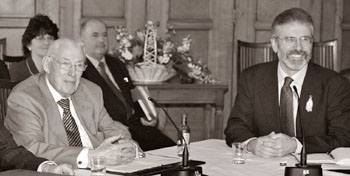Epochal moment in Northern Ireland
 It could be said to be a testing time for the whole of Britain;
particularly for the champions of non-violence and democracy. It could be said to be a testing time for the whole of Britain;
particularly for the champions of non-violence and democracy.
|

Democratic Unionist Party leader Ian Paisley (L) and Sinn Fein
leader Gerry Adams speak to the media during a news conference at
the Stormont parliament buildings in Northern Ireland March 26,
2007. Northern Ireland’s main Protestant and Catholic parties agreed
on Monday to start sharing power on May 8 after their leaders put
aside decades of hostility to hold a historic first meeting.
(Reuters) |
Apparently, a May 8 deadline to put in place a power-sharing
administration between the main Protestant and Catholic parties in
Northern Ireland would now be met and if all goes well sectarian strife
in the British province would ease off.
The mood likely to be prevailing among those opposing peace deals
with "terrorists", was summed up in a pronouncement by Lord Norman
Tebbit, who was injured in an IRA bomb blast in 1984: "It is a pity, I
feel, that we now expect to see those who have been tried for conspiracy
to murder taking office as Ministers in a government in this United
Kingdom".
This is no unfamiliar dilemma; particularly for those states battling
insurrectionist violence in South Asia.
There is an experiment in the making in Nepal, for instance, where
the most violence prone Maoist rebels are in a power sharing
administration with the Nepali Congress and its allies. In fact, they
are a party to drawing up a new constitution for Nepal.
Meanwhile, in the Philippines the Moro rebels have been assured
"self-determination" by the centre and in Indonesia the Aceh province
has been granted a measure of regional autonomy following a long-running
bloody rebellion. These are only the latest in a number of Asiatic armed
movements for separate statehood or regional autonomy which have been
defused by political means. Identity-based armed rebellions such as
these are usually contained by addressing the legitimate political
aspirations of the groups concerned.
India could provide a rich harvest of lessons in this regard and its
recent moves to carve out more and more states are dictated by the need
to contain identity-based separatist movements.
Ideally, armed groups bent on bloodshed and destruction should be
alienated but experience proves that the more cost-effective approach to
resolving these conflicts is to get the groups concerned into the
democratic process or mainstream politics. In the alternative what
happens is that violence by these disaffected groups and counterviolence
by the state, allied with other repressive measures, only lead to a
vicious circle of violence which does not tend to end in a hurry.
Therefore, Northern Ireland and the British polity would be severely
affected in the long run as a result of not giving a power-sharing deal
between Sinn Fein and the Democratic Unionist Party (DUP) a try. It was
indeed "a turning point in the history of Northern Ireland", in the
words of Britain's Northern Ireland Secretary Peter Hain, when the heads
of Sinn Fein and the DUP, Gerry Adams and Ian Paisley, decided for the
first time in the history of the conflict to have face-to-face dealings
with each other.
Although this cannot be construed as an immediate cure for the
decades - long protestant-Catholic strife in Northern Ireland, the
experience of working together in a power-sharing regional
administration would enable the parties to adapt to each others
essential needs and resolve their problems more amicably.
Besides, since a measure of the Catholic community's power
aspirations would be met through the Northern Ireland assembly, the
possibility is great that the former "men in arms" would not be
compelled to revert to violence. Despite the justified and principled
opposition to violence, therefore, it would be in the interests of all
concerned, to give the power-sharing experiment in Northern Ireland a
try.
Accordingly, a power sharing arrangement should soon be in place in
Northern Ireland as a further expression of the democratic spirit
pervading Britain. Nothing could give more eloquent testimony to
peaceful cohabitation between the communities than a regional
administration with DUP chief Ian Paisley as First Minister and Sinn
Fein's Martin McGuinness as his deputy.
[email protected]
|
